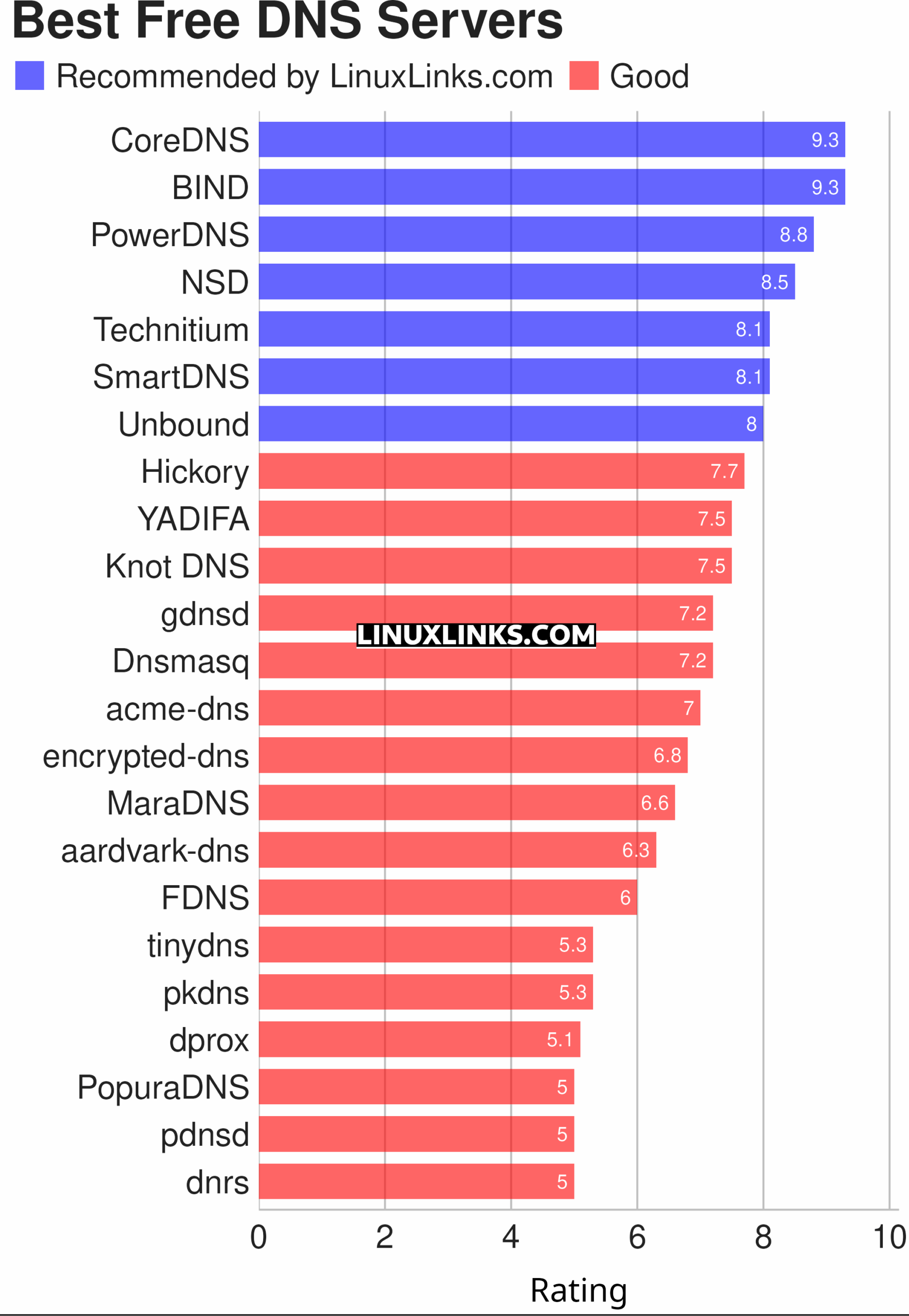The internet uses numbers, not names, to find computers. Domain Name System (DNS) is the internet’s directory service: It takes a human readable name, like “www.linuxlinks.com”, and converts that name to a machine readable “IP” address that your computer can use to connect to www.linuxlinks.com.
Browsers then use those addresses to communicate with origin servers or CDN edge servers to access website information. This all happens thanks to DNS servers: machines dedicated to answering DNS queries.
DNS is one of these things many take for granted that is critical to using the internet. Without DNS, the internet breaks. It’s critical that a DNS server keeps the internet working in a secure and stable manner.
DNS clients, which are built into most modern desktop and mobile operating systems, enable web browsers to interact with DNS servers.
This article selects our favorite DNS servers. Our verdict is captured in a legendary LinuxLinks-style chart. We only feature free and open source software in this article.

Let’s explore the DNS servers at hand. For each application we have compiled its own portal page, a full description with an in-depth analysis of its features, together with links to relevant resources.
| DNS Servers | |
|---|---|
| CoreDNS | DNS server that chains plugins |
| BIND | Flexible, full-featured DNS system |
| PowerDNS | Authoritative server, the Recursor, and Dnsdist |
| NSD | NLnet Labs Name Server Daemon |
| Technitium | Self host a DNS server for privacy and security |
| SmartDNS | Local DNS server that accepts DNS query requests from local clients |
| Unbound | Validating, recursive, caching DNS resolver |
| Hickory | Rust-based DNS client, server and resolver |
| YADIFA | Lightweight authoritative Name Server with DNSSEC capabilities |
| Knot DNS | High-performance authoritative-only DNS server |
| gdnsd | Authoritative-only DNS server |
| Dnsmasq | Network infrastructure: DNS, DHCP, router advertisement and network boot |
| acme-dns | Simplified DNS server with a RESTful HTTP API |
| encrypted-dns | Modern encrypted DNS server |
| MaraDNS | Small DNS server |
| aardvark-dns | Authoritative DNS server for A/AAAA container records |
| FDNS | Encrypted DNS proxy designed for small networks and Linux desktops |
| tinydns | Tiny DNS server with simple JSON config |
| pkdns | DNS server resolving pkarr self-sovereign domains |
| dprox | Lightweight DNS proxy server |
| PopuraDNS | Simple DNS server with decentralized domain names support |
| pdnsd | DNS server designed for local caching of DNS information |
| dnrs | DNS server written in rust |
This article has been revamped in line with our recent announcement.
An authoritative DNS service provides an update mechanism that developers use to manage their public DNS names. It then answers DNS queries, translating domain names into IP address so computers can communicate with each other.
Recursive DNS: Clients typically do not make queries directly to authoritative DNS services. Instead, they generally connect to another type of DNS service known a resolver, or a recursive DNS service.
 Read our complete collection of recommended free and open source software. Our curated compilation covers all categories of software. Read our complete collection of recommended free and open source software. Our curated compilation covers all categories of software. Spotted a useful open source Linux program not covered on our site? Please let us know by completing this form. The software collection forms part of our series of informative articles for Linux enthusiasts. There are hundreds of in-depth reviews, open source alternatives to proprietary software from large corporations like Google, Microsoft, Apple, Adobe, IBM, Cisco, Oracle, and Autodesk. There are also fun things to try, hardware, free programming books and tutorials, and much more. |

Filtred or not, i have read no word over filtering or real clean way..
What are you trying to say?
Recently stumbled on Technitium DNS server: looks full of features, can be kind of ADGuard as well as a full fledged server, and works on many OS/environments/architectures…
=> Seems to be a good candidate for this list !